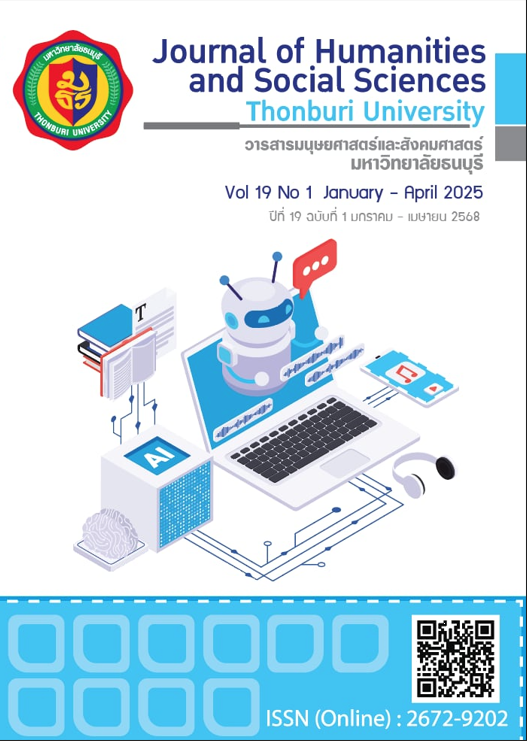การบริหารจัดการและการปรับตัวในสภาวะวิกฤตของคนรุ่นต่าง ๆ ในกรุงเทพมหานคร ตามหลักแนวคิด PESTEL
Main Article Content
บทคัดย่อ
งานวิจัยชิ้นนี้มีวัตถุประสงค์ เพื่อ 1) เพื่อศึกษาประชากรรุ่นต่าง ๆ ในแต่ละช่วงอายุ ในการบริหารจัดการและปรับตัวในช่วงภาวะวิกฤตโดยใช้แนวคิด PESTEL 2) เพื่อวิเคราะห์ปัจจัยในแต่ละมิติของ PESTEL ที่มีผลต่อความสามารถในการบริหารจัดการและการปรับตัวในภาวะวิกฤต โดยมีแบบแผนการวิจัยเชิงปริมาณ ประชากรที่ใช้ในการวิจัย คือ ประชากรที่อาศัยในเขตกรุงเทพมหานครทั้งหมด ทำการเก็บตัวอย่างจำนวน 385 คน โดยแบ่งเป็นกลุ่ม Baby Boomer จำนวน 98 คน, กลุ่ม Generation X จำนวน 111 คน, กลุ่ม Generation Y จำนวน 105 คน และกลุ่ม Generation Z จำนวน 71 คน ผลการศึกษา พบว่า กลุ่มอายุต่างกัน มีความสามารถในการบริหารจัดการและปรับตัวในสภาวะวิกฤตแตกต่างกัน โดยผลการเปรียบเทียบค่าเฉลี่ยการบริหารจัดการในสภาวะวิกฤตตามกลุ่มตัวอย่างรุ่นต่าง ๆ ต่างกันเป็นรายคู่ พบว่า กลุ่ม Baby Boomer มีค่าเฉลี่ยการปรับตัวแตกต่างจากกลุ่มอื่น ๆ ทั้งสามกลุ่ม การวิเคราะห์สมการถดถอยของปัจจัยตัวแปรอิสระต่าง ๆ กับการบริหารจัดการในสภาวะวิกฤต พบปัจจัยที่เกี่ยวข้อง 4 ปัจจัย คือ ปัจจัยด้านการเมือง ปัจจัยด้านเศรษฐกิจ ปัจจัยด้านสิ่งแวดล้อม และปัจจัยด้านกฏหมาย เมื่อวิเคราะห์สมการถดถอยของปัจจัยตัวแปรอิสระต่าง ๆ กับการปรับตัวในสภาวะวิกฤต พบปัจจัยที่เกี่ยวข้อง 4 ปัจจัย คือ ปัจจัยด้านการเมือง ปัจจัยด้านเศรษฐกิจ ปัจจัยด้านสังคม และปัจจัยด้านกฏหมาย
Article Details

This work is licensed under a Creative Commons Attribution-NonCommercial-NoDerivatives 4.0 International License.
ผลงานที่ปรากฎในวารสารฉบับนี้เป็นลิขสิทธิ์เฉพาะส่วนบุคคลของผู้เขียนซึ่งต้องรับผิดชอบต่อผลทาง กฎหมายที่อาจเกิดขึ้นได้และไม่มีผลต่อกองบรรณาธิการReferences
สำนักงานสถิติแห่งชาติ. (2567) สืบค้นเมื่อ 1 พฤษภาคม 2567, จาก http://statbbi.nso.go.th/staticreport/page/sector/th/03.aspx
Aguilar, F. J. (1967). Scanning the Business Environment. New York: Macmillan.
Barton, L. (1993). Crisis in Organizations: Managing and Communicating in the Heat of Chaos. Cincinnati: South-Western Publishing.
Chiam, J. C. S., & Lim, T. W. (2021). Coping with unrest in the periphery of China: Comparative case studies of Thailand, Myanmar and HKSAR. China and the World, 4(2), 2150008. World Scientific. Retrieved from https://www.worldscientific.com/doi/abs/10.1142/S2591729321500085
Engeström, Y., & Sannino, A. (2021). From mediated actions to heterogeneous coalitions: Four generations of activity-theoretical studies of work and learning. Mind, Culture, and Activity, 28(1), 4-23. https://doi.org/10.1080/10749039.2020.1806328
Fink, S. (1986). Crisis Management: Planning for the Inevitable. New York: AMACOM.
Garai-Fodor, M. (2022). The impact of the coronavirus on competence from a generation-specific perspective. Acta Polytechnica Hungarica, 19(8), 111-125. Retrieved from http://epa.niif.hu/02400/02461/00124/pdf/EPA02461_acta_polytechnica_2022_08_111-125.pdf
Johnson, G., Scholes, K., & Whittington, R. (2008). Exploring Corporate Strategy: Text and Cases. 8thed. Harlow: Financial Times Prentice Hall.
Lazarus, R. S., & Folkman, S. (1984). Stress, Appraisal, and Coping. New York: Springer Publishing Company.
Masten, A. S. (2001). Ordinary Magic: Resilience Processes in Development. American Psychologist, 56(3), 227-238.
Mitroff, I. I. (2005). Why Some Companies Emerge Stronger and Better from a Crisis: 7 Essential Lessons for Surviving Disaster. New York: AMACOM.
Tuli, F. A., & Vadiyala, V. R. (2022). Crisis management in South East Asia's tourism industry: Resilience and adaptation strategies. Global Disclosure of Economics and Business, 11(1), 35-48. Retrieved from https://www.researchgate.net/profile/Vishal-Reddy-
Weick, K. E., & Sutcliffe, K. M. (2001). Managing the Unexpected: Assuring High Performance in an Age of Complexity. San Francisco: Jossey-Bass.
Translated Thai References
National Statistical Office of Thailand. (2024). Retrieved May 1, 2024, from http://statbbi.nso.go.th/staticreport/page/sector/th/03.aspx (in Thai)

